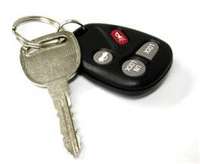How to Make Your Teen a Safer Driver
 |
"Hands on the wheel, eyes on the road and buckle up!" These are tips that parents often tell their newly minted teen drivers to help keep them safe during their commutes. But, a recent survey by Honeywell Friction Materials shows that while many parents indicated having discussed safe driving habits, far fewer knew when to conduct many basic maintenance inspections - such as proper tire inflation and brake wear - that could help avoid breakdowns or accidents while driving. Parents surveyed indicated that almost one-third of their new teen drivers experience a roadside breakdown in their own vehicle by the time they are 19 years old. In addition, one in four teens don't care how their vehicle works, as long as it works. These results fueled Honeywell Friction to launch a digital campaign, Bendix Brakes for Teen Safety, to educate parents and teens on the car care basics that can help prevent them from being stranded on the side of the road.
1. Check your tires - make sure your tires are properly inflated to the suggested pressure, as listed in your vehicle's manual. This not only prevents damage that could side-line your teen driver, but it also results in better fuel efficiency. You'll also want to make sure your tires have enough tread, as their grip on the road also effects the safety of the vehicle.
2. Be aware of your brakes' condition - if your pedal goes all the way to the floor or you hear strange noises when applying your brakes, chances are they need to be repaired or replaced. As a rule, you should have your brakes checked out by a professional once per year, or every 10,000 miles.
3. Check your windshield wipers - if you can't see where you're going, you've got a problem. Wipers play a big role in keeping your windshield clean, regardless of the weather. If your wipers are old or damaged, they could be doing more harm than good for your vision.
4. Lights guide the way - much like your wipers play a part in your vision as a driver, so too do your headlights. Make sure you inspect your vehicle's lights regularly, as a faulty bulb could lead to decreased vision at night, which endangers you, your passengers and other drivers on the road. Be sure to check for brake lights and turn signal functionality as well.
5. Check fluid levels - engine oil needs replacement every 3,000 miles, on average. You should also check it regularly to ensure you don't have a leak. Other important fluids include anti-freeze - which prevents the vehicle from overheating - and wiper fluid, which most oil change outlets refill for free when asked.
Stay alert - above everything else, being aware of your surroundings and conditions is key to staying safe on the road.


